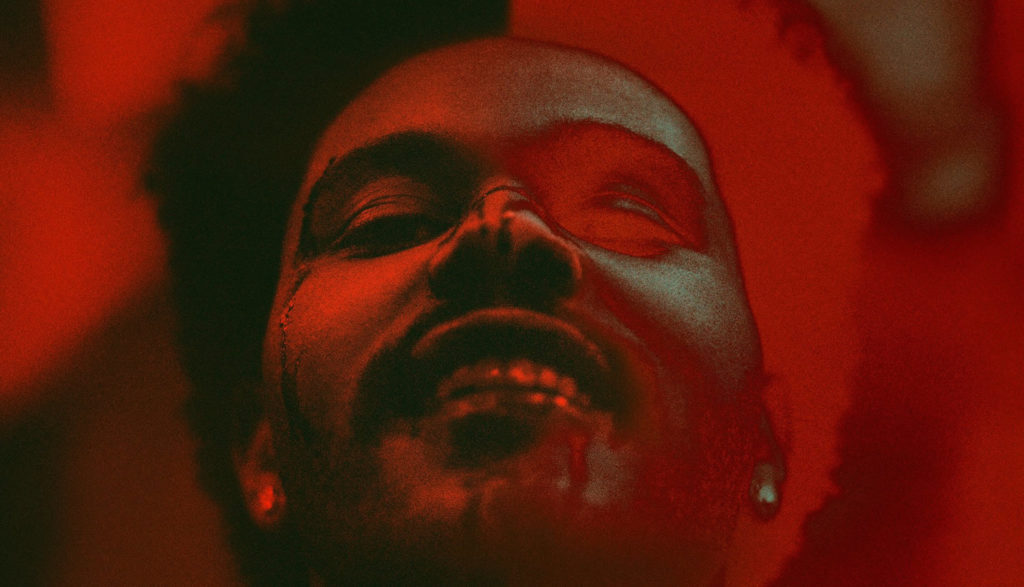
For the past decade, The Weeknd has jockeyed for position in the crowded mainstream music spotlight. Over the course of four major studio albums and dozens of singles, Abel Tesfaye has created an antihero character in The Weeknd. That character encompasses a paradox: He embraces the material successes of fame, while simultaneously being defined by despair amid his excess and pleasure.
There’s also a certain cinematic style in how Tesfaye weaves The Weeknd’s narratives around devastating, cyclical love. He longs to fill the profound void created by loss and lonliness. But on After Hours, The Weeknd portrays how his inescapable despair translates to brooding isolation and spiraling emotional instability.
“Hardest to Love” features these remorseful lyrics: “I’ve been the hardest to love/It’s hard to let me go, yeah.” He doubts the woman he’s singing to could still want him after everything he’s done to her, “I can’t, can’t believe you want me/After all the heart breaks, after all I’ve done.” We hear similar regret and reflection on “Scared to Live”: “I am not the man I used to be/Did some things I couldn’t let you see.”
Elsewhere, “Save Your Tears” hints at compassion as The Weeknd recognizes some failures: “I realize that I’m much too late/And you deserve someone better/Save you tears for another day.”
On “Blinding Lights,” The Weeknd realizes that he can’t fix everything on his own and he needs someone else to rely on: “I’ve been on my own for long enough/Maybe you can show me how to love, maybe.” “Escape to LA” shares the same sentiment as he sings, “Got the money, go the cars, got the ceiling with the stars/Got everything I wanted/But I’d be nothing without you.”
Despite his remorseful confessions, The Weeknd ignores opportunities to change his behavior. Instead, he avoids reconciliation and renews his lease in the world of tortured, violent and lonely love.
“Faith” is perhaps the album’s most concerning track as The Weeknd combines a variety of troubling behaviors: “Light a blunt up with the flame/Put that cocaine on a plate/Molly with the purple rain/’Cause I lost my faith.” But he continues reveling in self-indulgent pleasures, “I’ve been sober for a year/Now it’s time for me/To go back to my old ways … ” What’s the reason for this relapse? He tells us that “I lost my faith/I’m losing my religion every day.” Eventually, his joyride ends “in the back of a flashing car/The lights are blinding me again” Obviously, his previous remorse did little to change his actions and eventual consequence.
Laced with drug references and promiscuity, “Snowchild” captures the fulfillment he seeks from sexual satisfaction. But when sex doesn’t satisfy, he turns to diamonds, cars, and money, “Always livin on the road, rockin Louis à la mode, n-gga/Twenty mill’ mansion, never lived in it.”
“Escape from LA” describes the demoralizing effects of a failed relationship. There, The Weeknd very crudely describes how he’s a “slave” to a woman’s body. He also recounts sexual encounters where he cheats with other women. “We had sex in the studio/Nobody walked in/ … She’s all mine until he calls her line.”
“Repeat After Me” verbally menaces and manipulates an ex as The Weeknd tries to get her to break up with her current guy: “You don’t love him, you’re just f—–g.” “Heartless” illustrates how The Weeknd’s alternative plan for the future that doesn’t resemble much of a plan at all, “Never be a wedding plan for the heartless/Low life, for life ‘cause I’m heartless.”
“Alone Again” reveals the singer’s loneliness, “I don’t know if I can be alone again/I don’t know if I can sleep alone again.” He is paralyzed by loneliness to the point he can’t sleep alone, so much so that he would go back to a failed relationship to avoid his fear. On “Too Late” he sings, “I tell myself I should get over you/I said ooh, I know I’d rather be all over you.” “After Hours” also illustrates his level of adependency, “Without you, I can’t sleep/Insomnia relieve/Talk to me, without you I can’t breathe.”
The Weeknd’s occasional remorse never matures into lasting confession for his past mistakes, the kind that might help spur this guy to make real, lasting changes. Indeed, as After Hours’ narrative bleeds together from song to song, the singer’s moody introspection and self-loathing isolation do little to provide hope for eventual change.
And there isn’t much reason to believe that The Weeknd will leave his cocoon of post-breakup ballads overstuffed with unapologetic behavior any time soon. After listening to the album, it seems that Tesfaye doesn’t want to leave at all.
Therein rests the paradoxical magnetism of The Weeknd’s situation. While his style and musical ambition are innovative, his narratives hardly change and in fact become more consumed with melodramatic self-pity and an insatiable sexual appetite
After Hours may boast an innovative sound, but it remains the same story fueled by explicit depictions of sex and failed love. For Abel Tesfaye, hedonistic painkillers such as regretful sex, violence and drug consumption remain the vapid coping mechanisms that they’ve been from the beginning of his stardom.
